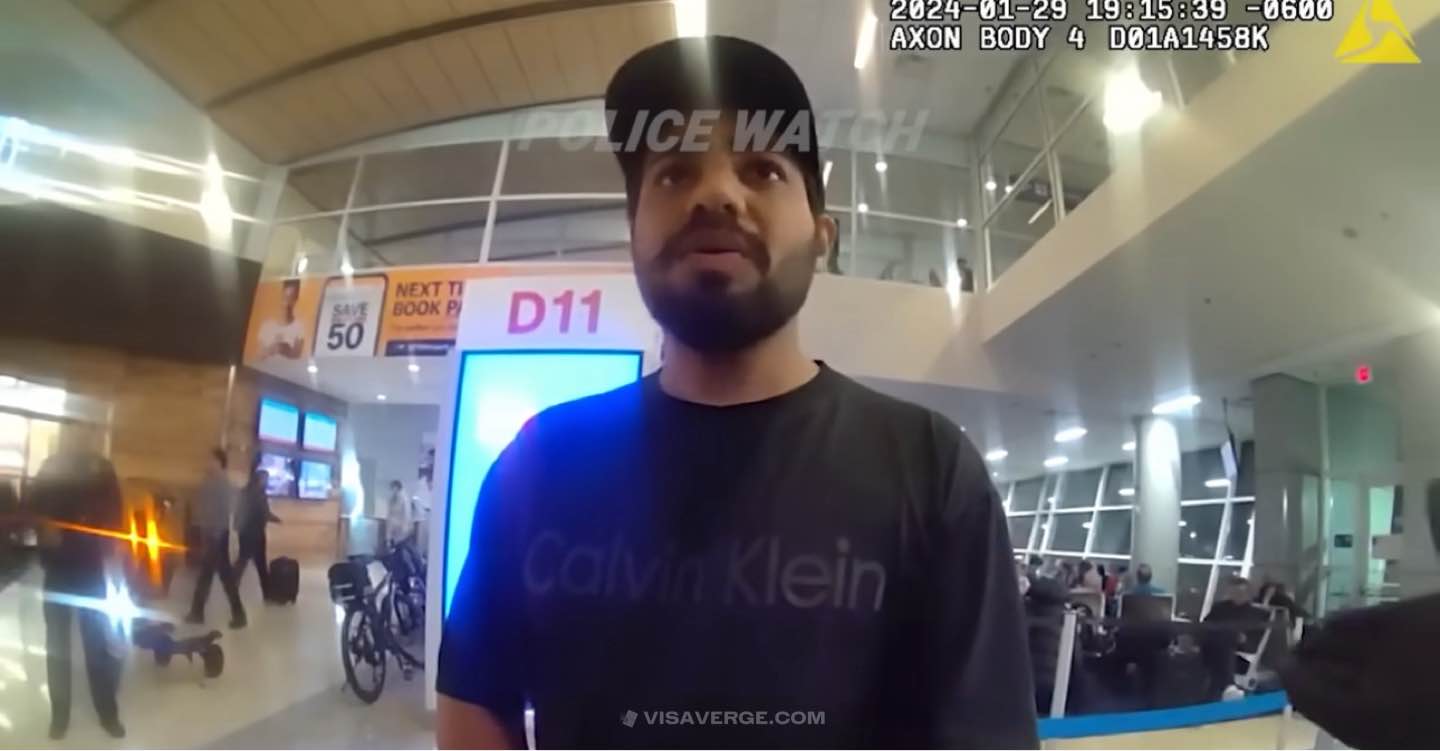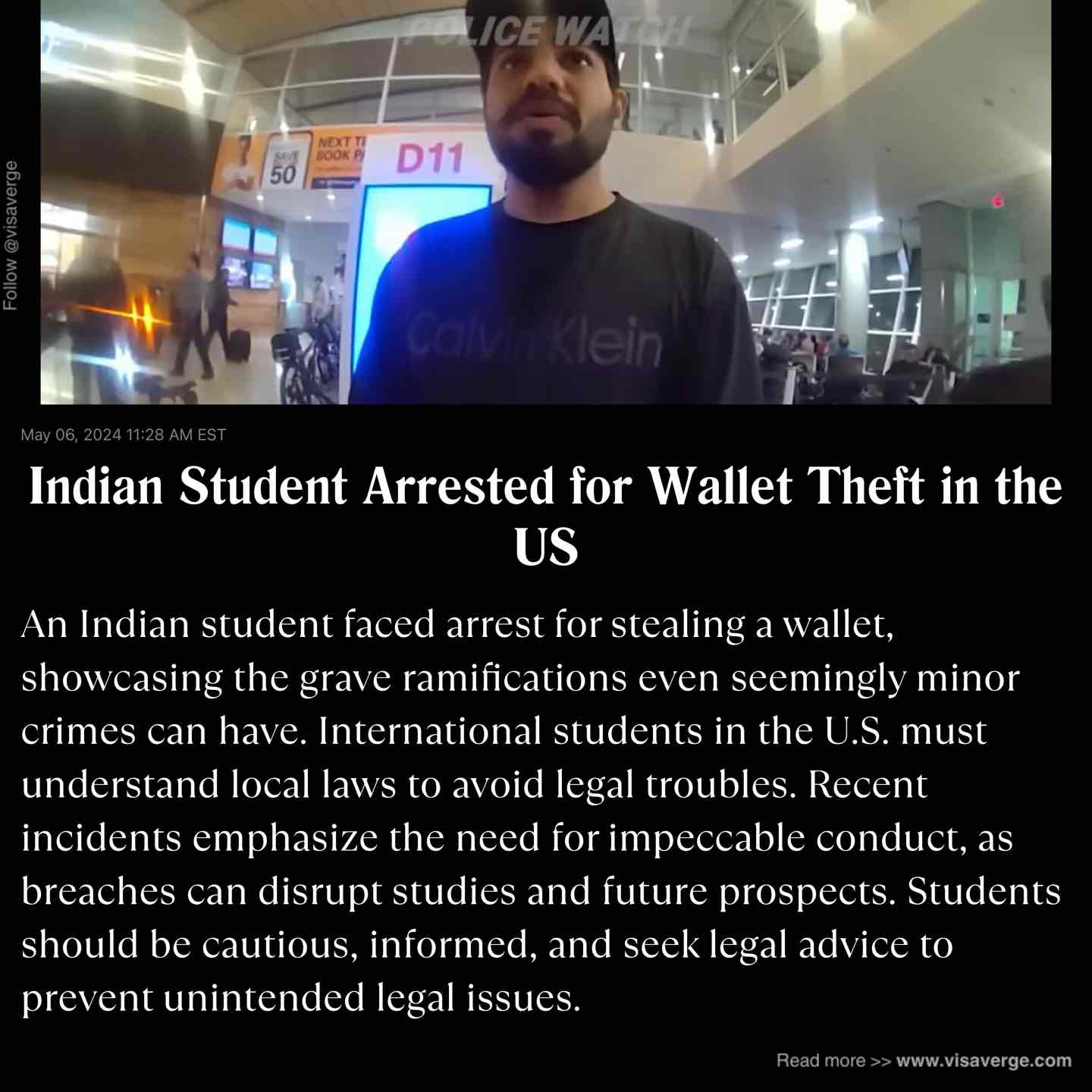The Consequences of Petty Crimes Abroad: A Close Look at the Arrest of an Indian Student
In an incident that highlights the severe ramifications of seemingly minor offenses, an Indian student was recently taken into custody for the theft of a wallet. This event throws into sharp relief the potential consequences of petty crimes for international students in the United States.

What Happened with the Indian Student?
According to reports, the incident was captured on CCTV, where the Indian student was seen taking a wallet. Despite clear evidence, the student did not admit to the act and instead presented excuses, claiming he came from a reputable family. His failure to acknowledge his wrongdoing complicated the situation further. The arrest not only disrupted his personal life by missing his flight but his educational pursuits and future career prospects are now at stake too. This circumstance serves as a hard lesson on the implications of petty offenses.
Arrest at the Airport: Student Detained for Alleged Theft at Luxury Store
Incident Overview
In a recent incident at a local airport, a male suspect, who identifies himself as a student preparing to fly to India, was detained by police on charges of theft. The arrest followed an accusation by a store employee at a Coach store, asserting that the young man had stolen a wallet while she was assisting him.
Details of the Theft
The incident unfurled when the female employee of the Coach store alerted authorities about a suspected theft. According to her, she was helping the suspect when he surreptitiously took a wallet and concealed it in his backpack. She also mentioned that the store had clear video footage capturing the act, which she could provide to support her claim.
Police Intervention and Questioning
Acting on the information provided by the store employee, law enforcement officers located the suspect at the airport waiting for his flight. The officers, one male, and one female approached the suspect to question him about his recent visit to the Coach store. Initially, the suspect denied all accusations, stating that he had made a legitimate purchase of a bag intended as a gift for his mother and had not taken anything else.
Law Enforcement’s Response
Officers located the suspect at his boarding gate and began an inquiry. Officer 1 initiated the interaction with straightforward questions: “How are you doing? Did you just leave the Coach store? What did you buy in the store?” The suspect mentioned buying a bag for his mom but denied acquiring anything else.
Confrontation and Discrepancies
As the questioning continued, discrepancies began to surface. Officer 2, after confirming details with the store employee over the phone, challenged the suspect about the color of the wallet and proceeded with searching his belongings. “Um… what color was the wallet? … Okay, just give me one second, I want to search this stuff, okay?”
The Suspect’s Defense
The most contentious part of the event involved the suspect’s insistence that the wallet was given to him as part of a promotion, a claim consistently refuted by the employee. The suspect stated, “She told me that this comes with this, this is… this… this comes with an offer, she gave it to me, right?” Meanwhile, the store employee contradicted this statement, reinforcing that no such promotion existed and asserting, “We didn’t give anything to him, ma’am.”
Evidence and Contradictory Claims
As the interrogation continued, Officer 2, after reconfirming facts with the store employee, reported that the video evidence depicted the suspect taking the wallet. Contrary to his initial statement, the suspect then altered his narrative, alleging that the wallet was given to him as part of a promotional gift—an assertion immediately refuted by the employee who confirmed no such promotion was underway.
The Arrest
Amidst the suspect’s assertions of innocence and pleas concerning his impending flight and luggage, the police made the decision to detain him for further investigation. This decision was based on the evidence provided by the video footage and the testimonies of the store employee.
Key Points Highlighted in the Case
- Identification and Evidence: The store employee was able to provide a comprehensive description of the suspect and the stolen item. Moreover, the presence of video footage played a pivotal role in verifying the facts of the case.
- Suspect’s Defense: Throughout the inquiry, the suspect insisted on his innocence, claiming he came from a “good family” and was merely a student. His claims, however, lacked consistency; first denying the theft, and later arguing that the item was a gift.
- Employee Testimony: The store employee firmly denied any promotional gift claims, reaffirming that the wallet was never meant to be a giveaway item.
Why Should International Students Avoid Legal Troubles?
The case of the Indian student arrested for stealing a wallet underscores a broader issue faced by international students—navigating a different legal and cultural landscape. For any international student, an arrest can lead to disruptions not only in studies but also impact future job opportunities. More painfully, it becomes a source of distress for their families back home.
Moreover, the U.S. is known for its stringent enforcement of laws. The student’s actions and subsequent arrest showcase the seriousness with which the U.S. treats theft, no matter how small the item involved. This example serves as a stern warning to other international students about the importance of abiding by local laws to avoid dire consequences. U.S. Citizenship and Immigration Services provides further guidance on the rights and responsibilities of international students in the U.S.
What Can Indian Students Learn from These Incidents?
The ordeal of the student wallet theft is not standalone. There have been other instances, such as the arrest of two Telugu students for shoplifting, shedding light on a worrying trend among some Indian students engaging in criminal activities abroad.
Students venturing internationally for education must recognize that they are ambassadors of their home country. Their actions can either contribute to a positive image or perpetuate stereotypes. Thus, maintaining impeccable conduct is paramount.
How Can International Students Protect Themselves from Unintended Legal Issues?
- Understand Local Laws: Familiarize yourself with the legal system of the host country. Knowing what is expected legally can help avoid unintentional violations.
- Stay Informed: Ignorance is often not an excuse in legal scenarios. International students should take proactive steps to inform themselves about what is deemed illegal in their new environment.
- Seek Legal Help: If unsure about the law, consulting a legal expert can prevent potential pitfalls. Most universities offer free legal counseling for their students.
- Peer Influence: Be cautious of the company you keep; peer pressure can sometimes lead to unfavorable actions.
Also, Consider the Precedent of Other Similar Cases
Another incident underscoring the strict enforcement of theft laws occurred at the Dallas/Fort Worth International Airport. In January, a passenger was arrested for attempting to steal a wallet from a COACH store at the airport. Despite his attempts to convince police that the wallet was given as a gift, surveillance footage clearly documented the theft.
This incident not only demonstrates the effectiveness of security measures like CCTV in catching offenders but also acts as another stark reminder of the serious repercussions of committing even minor crimes.
Learning from Mistakes
These incidents involving theft should be a wake-up call for all international students. Adjusting to a new country can be challenging, and the last thing an international student needs is legal trouble complicating their stay. Whether it’s a stolen wallet or another minor infraction, the consequences can be disproportionately severe, impacting education, future employment, as well as personal and family life.
It’s imperative for international students to understand that while they are in a foreign nation, they are subject to its laws and regulations. Maintaining strict adherence to these laws not only ensures a smooth educational journey but also helps in building a positive reputation, ultimately assisting in their professional and personal growth in the global arena.
Learn Today:
Glossary
- International Student: A person who has traveled from their home country to another country, such as the United States, for the primary purpose of studying at an educational institution. International students often face unique legal and cultural challenges while studying abroad.
- Legal Troubles: Refers to situations where an individual, in this context, an international student, encounters legal issues or violations of the law in the host country. Legal troubles can range from minor offenses, such as theft of a wallet, to more serious crimes, and can have significant consequences on one’s academic and professional pursuits.
-
Criminal Activities: Actions that violate the laws of the host country, including offenses like theft, shoplifting, or any other illegal activities. It is essential for international students to understand and abide by the legal framework of the country they are studying in to avoid legal repercussions and negative impacts on their academic and personal life.
-
Immigration Laws: Rules and regulations established by a country governing the entry, stay, and rights of foreign nationals within its borders. International students must comply with immigration laws to legally study in a foreign country and may face deportation or other penalties for non-compliance.
-
Surveillance Footage: Video recordings captured by closed-circuit television (CCTV) cameras in public or private spaces to monitor activities and provide evidence in the event of incidents like theft. Surveillance footage, as seen in the case of the Indian student stealing a wallet, plays a crucial role in identifying offenders and enforcing legal actions.
This Article In A Nutshell:
The arrest of an Indian student for stealing a wallet underscores the severe consequences of petty crimes for international students in the US. Understanding local laws, seeking legal guidance, and avoiding negative influences can prevent legal troubles. Such incidents should serve as a cautionary tale for students abroad. Be informed, stay lawful.
— By VisaVerge.com
Read more:
- Indian Student Achinthya Sivalingan Arrested During Pro-Palestine Protest at Princeton
-
Incident Involving Indian Graduate Students Shoplifting at ShopRite in the U.S.
-
Hyderabad Student Wrongfully Arrested in the UK: Family Appeals for Government Intervention














